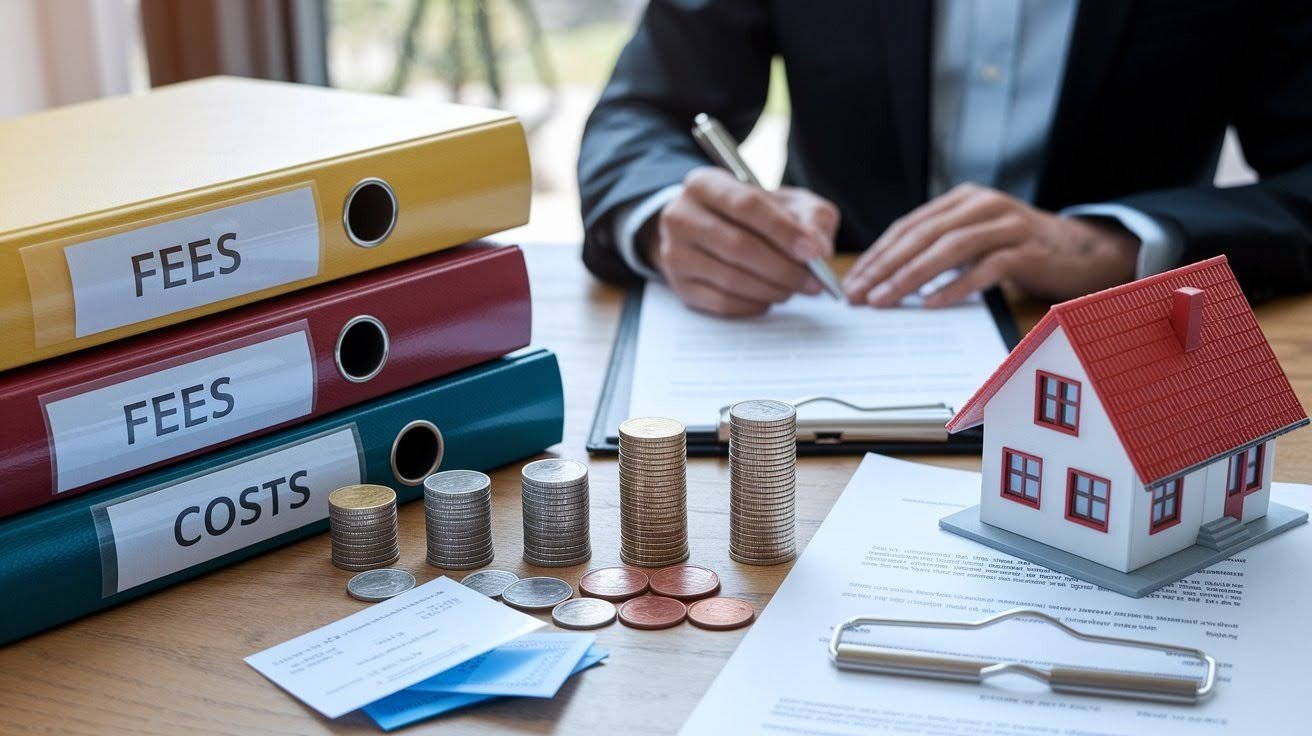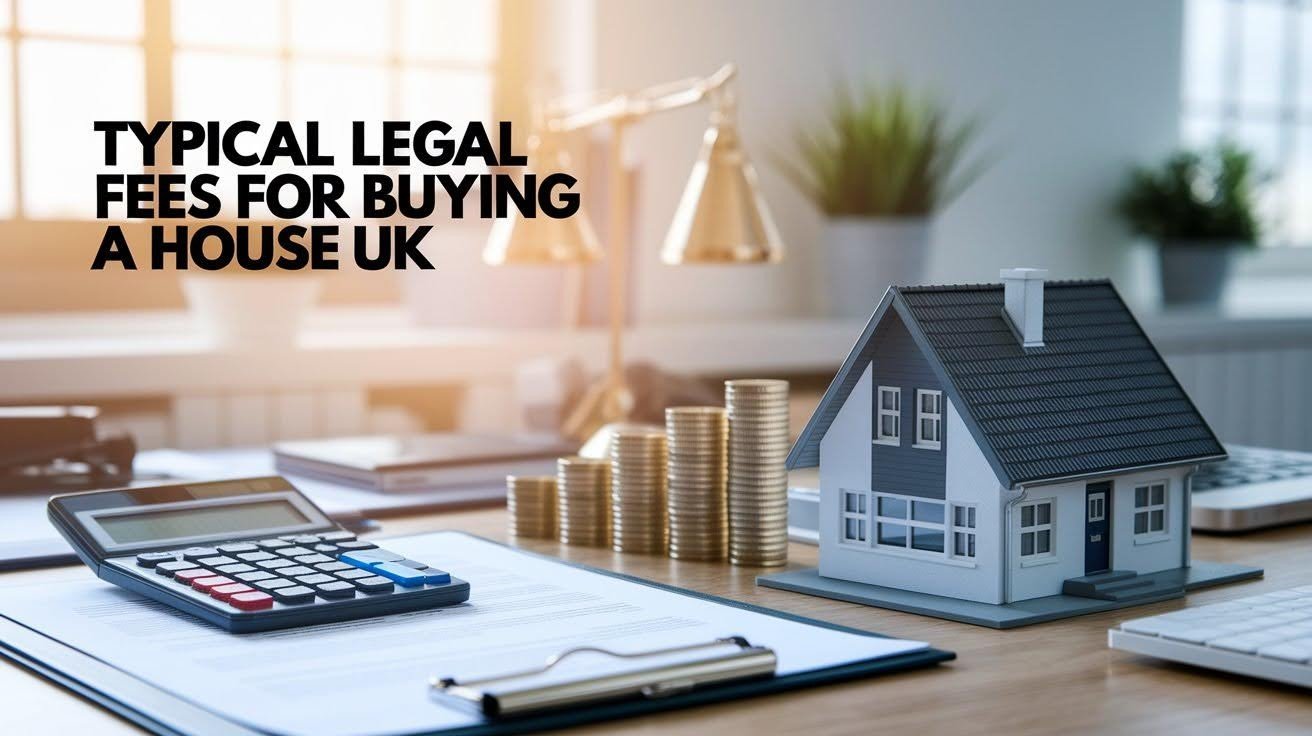Buying a property is an exciting time, but despite all the costs involved in buying a house, it’s easy to forget the extra fees you have to pay, such as legal fees.
Understanding potential UK home costs avoids future unpleasantness. Legal fees are usually between £800 and more than £2000. This depends upon the property type and location.
This guide explains the legal costs of buying a house, solicitors’ fees, and other costs you’ll pay, along with how to budget appropriately. By the end of it, you’ll understand the full legal costs of buying a house. You can then budget properly.
Average Total Legal Costs in 2025
For a freehold property worth £285,000, you’ll typically pay around £1,926 in total legal costs. This includes everything from your solicitor’s fees to required searches and checks.
Leasehold properties cost more because they involve extra work. For the same property value, expect to pay about £2,687. The difference comes from additional lease reviews and management company communications.
Most buyers spend between £800 and £2,000+ on legal fees. Your final bill depends on how complicated your purchase is. A simple freehold house in a rural area costs less than a leasehold flat in a city center.
Quick Cost Breakdown
Base legal fees form the largest part of your bill. For freehold properties, this averages £1,276, while leasehold properties cost £1,552. This covers your solicitor’s time and expertise throughout the buying process.
Disbursements are the costs your solicitor pays to other companies on your behalf. These run about £650 for freehold properties and £1,135 for leasehold ones. Think of these as pass-through expenses that your solicitor handles for you.
Additional fees can appear depending on your situation. If you need extra searches, have a gifted deposit, or face complications, these costs will increase. Always ask your solicitor for a complete quote upfront.
What These Fees Cover
Your solicitor’s professional time is the main service you’re paying for. They review contracts, communicate with the seller’s solicitor, and make sure everything is legal and correct. This expertise protects you from costly mistakes.
Legal searches and checks are required to make sure the property is safe to buy. Your solicitor orders reports on the land, drainage, and local planning issues. These searches can reveal problems before you commit to the purchase.
Property transfer and registration complete the process. Your solicitor handles the money transfer, registers your ownership with the Land Registry, and makes sure all documents are filed correctly. This ensures you legally own your new home.
What are the Three Components of Legal Fees?
Every legal bill has three main parts, and knowing them helps you budget accurately.
Base Legal Fees (Solicitor’s Professional Fees)

Base fees cover all the work your solicitor does for you. This includes reviewing contracts, doing legal checks, answering your questions, and managing the entire purchase process. These are the fees for their professional knowledge and time.
Property value affects how much solicitors charge. A £150,000 house typically costs less in legal fees than a £600,000 property. The higher the value, the more time and responsibility your solicitor takes on.
VAT adds 20% to your solicitor’s base fees. If your base fee is £1,000, you’ll actually pay £1,200 after VAT. Always check if quotes include or exclude VAT to avoid surprises.
Disbursements (Third-Party Costs)

Disbursements are expenses your solicitor pays to other organizations for required services. These include Land Registry fees, search companies, and identity verification services. Your solicitor collects this money from you and passes it on.
These costs are separate because your solicitor doesn’t control them. They’re set by government agencies and private companies. Your solicitor is simply the middleman who arranges and pays for these services on your behalf.
Most disbursements are predictable and standard. Search fees, registration costs, and basic checks are similar across the country. However, some areas have higher fees than others, especially in major cities.
Additional Fees

Extra charges apply when your purchase becomes more complex. If you’re buying a shared ownership property, a new build, or a property with unusual features, expect higher fees. These situations require more work from your solicitor.
Common scenarios that cost more include gifted deposits from family members, buying at auction, or dealing with a property that needs lease extensions. Each of these requires extra paperwork and verification. Your solicitor will tell you upfront if these apply to your situation.
Multiple properties purchased at once also increase costs. If you’re buying more than one property, each one needs separate legal work. Some solicitors offer discounts for multiple purchases, so it’s worth asking.
What Affects Legal Fees When Buying a House UK?
Understanding what affects your costs helps you get accurate quotes and budget properly.
Property Type
Freehold properties cost less in legal fees because they’re simpler. You own the building and the land outright, so there’s less paperwork. The typical legal fees for buying a house UK that’s freehold average around £1,926 for a standard property.
Leasehold properties require extra work and cost about £761 more on average. Your solicitor must review the lease agreement, check service charges, and communicate with the management company.
The complexity of leasehold agreements varies greatly. A simple flat might not cost much more, but a property with complicated restrictions or short lease terms will increase your legal bill significantly.
Property Value
Price bands determine what your solicitor charges. Most firms use a sliding scale where higher-value properties cost more in legal fees. This reflects the increased responsibility and potential liability they take on.
A £150,000 property might cost £800-£1,200 in base legal fees. But a £600,000 property could run £1,500-£2,500 or more. The percentage your solicitor charges typically decreases as property value increases, but the total cost still goes up.
The difference isn’t always dramatic. Moving from a £200,000 to a £300,000 property might only add £100-£300 to your legal fees. Always get specific quotes based on your actual property value.
Transaction Complexity
Standard purchases follow a straightforward process. The property has clear ownership, no planning issues, and a simple contract. These transactions keep your legal fees at the lower end of the range.
Complex purchases need more solicitor time and expertise. Problems with boundaries, planning permissions, access rights, or title issues require extra investigation. Each complication adds hours of work and increases your bill.
New builds, properties sold at auction, and homes needing major lease work fall into the complex category. These situations need specialized knowledge and more careful review. Your solicitor might charge 25-50% more for complicated purchases.
Location
Regional variations affect the typical legal fees for buying a house UK more than you might think. London and Southeast solicitors often charge more due to higher operating costs. However, you’re not limited to using a local solicitor.
City properties typically cost more in both legal fees and disbursements. Urban areas have more planning regulations to check, and local authority searches cost more. Rural properties often have simpler local searches and fewer planning complications.
You can save money by using a solicitor from a different area. Many firms work remotely and charge less than London-based solicitors. Just make sure they’re experienced with your property type and location-specific issues.
Detailed Breakdown of Disbursements
These third-party costs make up a significant portion of your total legal expenses.
Stamp Duty Land Tax
Stamp Duty is usually your biggest single cost when buying property. It’s a government tax based on your property’s purchase price. Most buyers pay this unless they’re first-time buyers purchasing below the threshold.
First-time buyers don’t pay Stamp Duty on properties up to £425,000 (or up to £625,000 in some cases). This can save you thousands of pounds. Your solicitor calculates the exact amount and handles the payment to HMRC.
The rates increase as property prices rise. For example, you pay nothing on the first £250,000 (if not a first-time buyer), then 5% on the portion between £250,001 and £925,000. Your solicitor will give you the exact figure for your purchase.
Property Searches (£200-£410)
Local authority searches cost £100-£250 and reveal crucial information. These checks show planning applications, building control issues, and local road schemes. They also tell you about nearby developments that might affect your property.
Environmental searches run £50-£100 and check for contamination risks. They show if the land was previously used for industrial purposes or if there’s flooding risk. These searches protect you from buying a property on problem land.
Water and drainage searches cost £50-£60 and confirm that the property connects properly to utilities. They show if there are any drainage issues or water supply problems. This information is essential before you complete your purchase.
Land Registry Fees
Registration costs range from £20 to £500, depending on your property’s value. Properties under £80,000 cost just £20 to register, while those over £1 million can cost £500. Your solicitor pays this to officially record you as the new owner.
New build properties sometimes have higher registration fees because they’re being registered for the first time. Existing properties already have records, so updating them is simpler. Your solicitor will know which category applies to your purchase.
This one-time fee gives you legal proof of ownership. Once registered, your name appears on the official Land Registry documents. This registration protects your ownership rights forever.
Identity and Compliance Checks
ID and anti-money laundering (AML) checks cost £10-£30 per person buying the property. These are legal requirements that all solicitors must complete. They verify your identity and make sure the purchase money comes from legitimate sources.
Bankruptcy checks cost £2-£3 per person and are a standard procedure. They confirm you’re not subject to any financial restrictions that would prevent the purchase. These quick checks protect both you and the seller.
Gift deposit verification adds extra costs if family members are helping with your deposit. Your solicitor must verify where this money came from to comply with money laundering regulations. This usually costs £50-£150, depending on complexity.
Money Transfer Fees
Telegraphic transfer costs run £40-£50 each time your solicitor sends money electronically. This secure method transfers your deposit and final payment to the seller’s solicitor. It’s safer than standard bank transfers for large amounts.
Most purchases require at least two transfers – one for the deposit and one for the final payment. Some situations need more transfers, like if you’re buying from multiple sellers or have a complex payment structure. Each transfer carries this fee.
Practical Tips for Buyers
Smart planning helps you manage the typical legal fees for buying a house UK without stress.
- Request a complete written quote early: Get your solicitor to list every fee, disbursement, and potential extra cost before you commit. This prevents surprises and helps you compare different solicitors fairly.
- Set aside 2-3% of your property value for all legal and related costs: This cushion covers legal fees, searches, surveys, and unexpected expenses. Better to have money left over than scramble to find more at the last minute.
- Ask about payment timing and methods: Some solicitors want money up front, others bill in stages. Know when you’ll need to pay and plan your cash flow accordingly to avoid delays.
- Check what’s included and what costs extra in your quote: Some quotes bundle searches and minor fees, others list everything separately. Make sure you’re comparing like-for-like when choosing between solicitors.
- Keep £500-£1,000 as contingency for unexpected costs: Problem searches, additional documents, or extended timelines can increase fees. This buffer means complications won’t derail your purchase.
Conclusion
The average legal fees when buying a house UK were approximately £1,926 for a freehold sale and £2,687 for a leasehold sale. This covers your solicitor’s time, the cost of searches which need to be carried out, and all the paperwork necessary to complete your purchase.
Ask different firms for transparent quotes for your work. Find out what you get for your price, how payment will be structured, and if there are any extras. However, the lowest bid may not be the best if all of the necessary services are not included.
The cost of legal fees is like insurance on your most expensive purchase, paying for a good job now will pay dividends later. If you spend time now finding the right solicitor and investigating costs and fees, you can buy with confidence.
Frequently Asked Questions
What are the typical legal fees for buying a house UK?
Legal fees typically range from £1,926 for freehold properties to £2,687 for leasehold properties. This includes solicitor fees, searches, and registration costs for a property worth around £285,000.
Are legal fees the same everywhere in the UK?
No, legal fees vary by location and solicitor. London and city solicitors often charge more than rural firms. Shop around and compare quotes from different areas to find better rates.
Can I negotiate my solicitor’s legal fees?
Yes, some solicitors negotiate fees, especially for straightforward purchases. Ask if they offer discounts for first-time buyers or can reduce fees. Always get any agreed discount in writing.
When do I pay legal fees during the house purchase?
Most solicitors require payment in stages. You’ll typically pay an initial deposit, more before searches, and the final amount before completion. Payment timing varies between firms, so ask upfront.
Do legal fees include Stamp Duty tax?
No, Stamp Duty is separate from legal fees. Your solicitor calculates and pays it on your behalf, but it’s a disbursement cost, not part of their professional fees. Budget separately for this.


